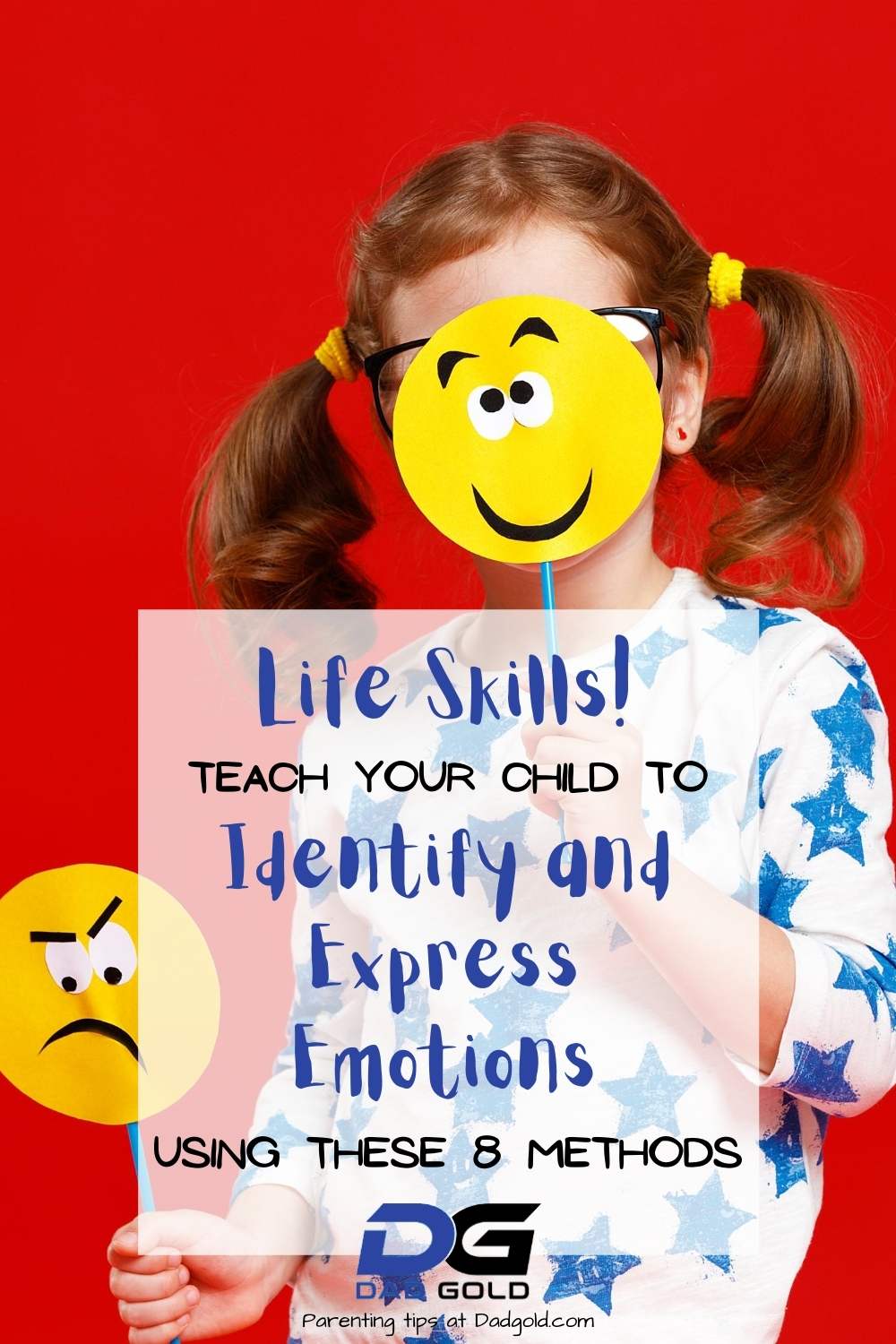Have you ever thought about the importance of emotional awareness?
You may not think it is important when your child is so young, but like all development, expressing emotions effectively is crucial and starts as early as children can communicate with you.
In this post, we will look at ways of teaching your child to identify and express emotions.

Why Is It Important For Children To Express Their Emotions?
Emotions are complex, even as adults. So imagine how overwhelming they must be to children. We usually see emotional outbursts as they face ‘new’ feelings, and these outbursts are generally the catalyst for punishment.
Although outbursts are standard, there are better ways to aid and respond to them for the good of your child’s development.
Throughout your child’s learning journey, it is important to reaffirm both to yourself and them that emotions are just energy.
They needn’t be suppressed or ignored, and avoiding emotions can negatively affect our stress system as children and adults alike. This is why it is crucial to develop ways to express and recognize them early.
8 Ways of Teaching Your Child to Identify and Express Emotions
Play Competitive Games
Do you ever lose it because you don’t win a game? Do you celebrate with a mini conga if you win? Games are a great way to explore emotions.
-

Bold Male Pride – Baseball Trucker Cap Celebrating Masculinity
£18.00 Select options This product has multiple variants. The options may be chosen on the product page -

Dad Bod Appreciation Gift Mug
£14.00 Add to cart -

Dad Bod, Bad Jokes Structured Baseball Cap
£22.00 Select options This product has multiple variants. The options may be chosen on the product page
You find a piece you need, you take out your opponent, you roll the dice and land on exactly what you wanted, or you are the person who has been taken out!
Different games bring out our competitive streaks and are a great way to deal with emotions as they happen.
There may well be fake money or pieces tossed up in the air for both winning and losing. Or the end of the game may result in lots of jumping, laughing, and excitement.
Games are live-action, and amongst discovering how to take losses on the chin and wins as mini celebrations, they are great emotions discoverers, even for adults!
Role Pay
Roleplay is a great way to put yourself in the shoes of another, and the same for your child. Doctors and nurses, firefighters, vets, shopkeepers, teachers; anything goes!
Games involving doctors and nurses or helping others are also a great way to introduce the concept of empathy to your children that will help to teach them to be selfless.
Empathy is a vital attribute in life, especially with the world’s speed and the various injustices we see around us. It can also lead to varying and diverse career options in adult life.
Read Books About Emotions
There are hundreds, if not thousands, of books that focus on emotions. These are great books for not only specifically making time to read, but they can be good at the end of the day to talk about the sort of day your child has had.
A best seller is Usbourne’s All About Feelings, which you can find on Amazon…
Books like this ensure that you give your child a visual prompt to feel and read appropriate or inappropriate ways to respond to external influences that determine our emotions.
You could even use books like this to talk about your feelings. ‘Remember earlier today when mommy was sad because she broke her favorite glass?’
Each moment you get with your child to have these conversations is another piece of their puzzle.
Talk About Your Child’s Emotions
Are they screaming with frustration because their doll won’t fit into the toy car? Are they stomping around the house because they can’t find their new Lego set?
Maybe a popular one is that a friend is over and wants to play something your child doesn’t, which leads to suling. Talk, talk, and more talk. The more you and your child talk about how they are feeling and why, the more familiar they will become in situations, leading to better handling of their emotions.
Starting by saying things like, ‘Let’s take a moment here and figure out how we can do this,’ are good ways to pause the tantrum and think practically to solve problems.
Talking with your child is incredibly different from talking to them. Ask them something and let them answer in their own words.
You can’t expect a child to use your tools in their own lives. Instead, they need to create their own, and they will do it in their time.
Tell Them How Their Behavior Makes You Feel
Equally, when you see a child respond positively or negatively to different situations, recognize them aloud. This may mean rewarding your child with praise or pulling them aside and gently asking them if there might have been a better way they could recognize their feelings.
Often, when emotionally immature as children are, anger is the first response to many emotions. Exploring what is underneath the anger is an effective way to help them express themselves.
Beliefs and morals stem from environments. What you give out will be absorbed. If you set the bar for emotions and the willingness to be open about how the behavior of others makes you feel, these are great foundations for solid boundaries.
Make A Feelings Cube
You can make feelings cubes out of cards or paper. Like conventional cubes, they have six sides, but instead of numbers, you can draw a face with different emotions.
Taking it in turns to roll it, you can both (or more people) act out whichever emotion you land on. For example, you can find lots of free templates online.
For instance, check out the free feelings cube template on Seedling Mentors. It is an excellent way of teaching your child to identify and express emotions.
Feelings cubes can be taken anywhere with you if you are on a long train journey, on a plane, or even if you are on vacation! It makes for a fun rainy day activity as well.
Try creating stories with the cube as you roll different emotions, and you can use it as the next part of your tale, a very creative way to explore feelings.
Use Puppets/Dolls/Lego for Role Play Games
While role pay yourselves can be a good idea, if your child is uncomfortable doing so, they could act out emotions using play puppets, dolls, etc.
Adults may sometimes need to take the lead and create a game. The less inhibited you are, the less they will be!
Conversations that encourage talking in general about great things or problems are fantastic for allowing creative words to form and giving children the time to explain themselves to you.
It may take a while for them to get everything out that they want, but that time you are silent to them, it means you are listening.
Try To Resist Punishing
Naughty steps and time-outs effectively deal with children’s behavior, but they do nothing to help them recognize or deal with their emotions.
These forms of punishment often lead children to detrimentally bottle up what they feel to the point where suddenly they burst. An explosive set of negative moments result in a vicious cycle of behavior equalling punishment.
Use these moments to encourage your child to process what they feel and why. It is all in the tone of voice you use with them and not the volume.
They will eventually be able to deal with the overwhelming moments properly the more they explore and express their own emotions, but they cannot do this effectively by themselves.
Conclusion
Teaching your child to identify and express emotions is not going to be easy, but it is a vital skill for them to learn in life, and you can develop that in your child by using the 8 methods identifier in this post.
Responding to emotions in an age-appropriate way takes time, and these reactions will change as your children age.
They should be encouraged at every opportunity to explore their feelings and know that it is acceptable to express how they feel.
The more they are given the opportunities to do so, the faster they will tackle their emotions independently.
Good luck!







